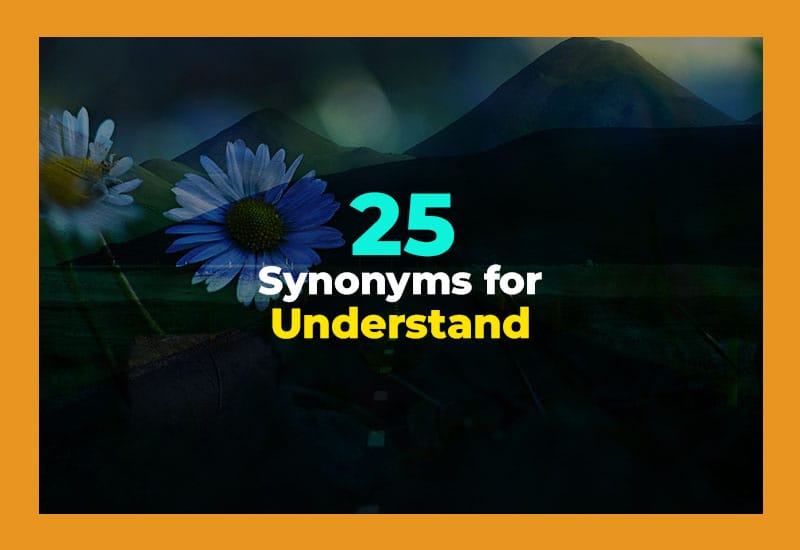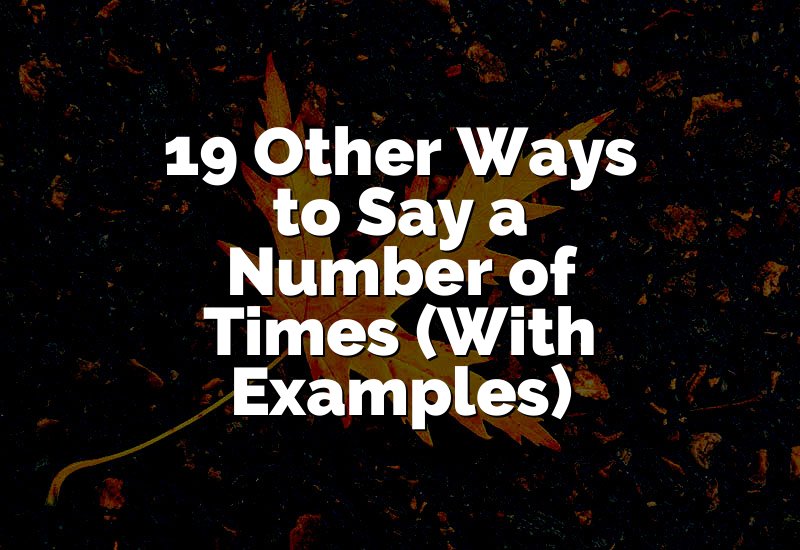You want to get the meaning of things quickly and clearly, right? Whether you’re chatting with friends, reading, or learning something new, having different ways to say “understand” can make your language way more fun and interesting. From simple words like get to more thoughtful ones like comprehend, there are tons of ways to say it.
1. Comprehend
To comprehend means to fully understand something, often something complicated or detailed. When you comprehend a topic, you know it well and can explain it. For example, "She took her time to comprehend the difficult math problem." It's a more formal way to say understand, used in school or work. Comprehend shows deep understanding, not just a quick guess. So when you truly grasp an idea or concept, you can say you comprehend it well.
2. Grasp
To grasp something means to hold an idea in your mind clearly. It's like mentally grabbing a concept and holding onto it. For example, "He finally grasped the meaning of the poem after reading it twice." Grasp is often used when understanding something new or tricky. It shows effort and success in learning. You might say, "It took me a while, but I grasp the instructions now." This word is perfect when you want to emphasize that you've understood something important or complex.
3. Fathom
To fathom means to understand something difficult or mysterious. It often shows surprise or difficulty in understanding. For example, "I can't fathom why she made that choice." It's a bit poetic and less common in everyday talk. Fathom is great when you want to express how puzzling or confusing something is, but you're trying hard to understand. It adds a thoughtful tone, like when you're trying to figure out someone's feelings or a strange situation.
4. Get
To get something is the easiest way to say you understand it. It's very common in casual talk. For example, "Oh, I get it now! Thanks for explaining." People use this word when they suddenly understand something or when it's clear to them. It's simple and friendly, great for all kinds of conversations. You might say, "I didn't get the joke at first, but now I do." Get is perfect for quick understanding in everyday life.
5. Follow
To follow means to understand the idea or story someone is telling. For example, "I'm following your explanation, so keep going." It's used when someone talks about steps or ideas, and you keep up with them. Follow shows you are paying attention and making sense of what is said. If you don't understand, you might say, "I can't follow what you mean." It's great for conversations, lectures, or stories where you need to stay on track.
6. Discern
To discern means to recognize or understand something, especially when it's not clear at first. For example, "She could discern the difference between the two paintings." It often involves careful thinking or noticing small details. Discern is more formal and is used when understanding something subtle or hidden. If you pay close attention and figure out something important, you discern it. This word suits situations where understanding takes sharp observation or thought.
7. Perceive
To perceive means to become aware of or understand something through the senses or the mind. For example, "He perceived a change in her mood immediately." It's about noticing and understanding feelings, ideas, or facts. Perceive is often used in thoughtful or formal contexts. It's not just about facts but also emotions and subtle signs. You might say, "I perceived the tension in the room." It's a good word when understanding involves more than just words.
8. Apprehend
To apprehend means to understand something, especially something difficult or serious. For example, "It took her a moment to apprehend the full meaning of the message." It's a formal word, often used in education or law. Apprehend also means to catch or arrest someone, but in understanding, it focuses on mentally grasping an idea. Use apprehend when talking about learning or realizing something important or serious.
9. Realize
To realize means to suddenly understand or become aware of something. For example, "I didn't realize the meeting was today." It's often used when a new fact or truth becomes clear. Realize can show surprise or a change in understanding. You might say, "She realized her mistake after hearing the explanation." It's a great word for moments when your understanding changes or grows quickly.
10. Recognize
To recognize means to identify or remember something familiar. For example, "I recognized the pattern in the puzzle." It's used when you see or understand something because you have seen or known it before. Recognize can also mean to understand someone's feelings or importance. For example, "He recognized her hard work and praised her." It's a useful word for understanding based on past knowledge or experience.
11. See
To see means to understand or realize something clearly. For example, "Now I see why you were upset." It's a simple, everyday word for understanding. Seeing something mentally is like having a clear picture in your mind. You can say, "I see what you mean." It's friendly and common, good for conversations when you want to say you get the idea.
12. Know
To know means to have information or understanding about something. For example, "I know how to fix the car." It shows a deeper level of understanding or skill. Knowing something means you are confident and sure about it. You can say, "She knows the answer to the question." It's one of the most basic words for understanding and is used in all kinds of situations.
13. Figure out
To figure out means to solve or understand something by thinking carefully. For example, "I finally figured out how to open the door." It's casual and often used when dealing with problems or puzzles. You might say, "We need to figure out a way to finish the project on time." It shows active thinking and success in understanding something that was not clear before.
14. Make sense of
To make sense of means to understand something confusing or unclear. For example, "I can't make sense of this messy handwriting." It's a phrase used when you try to understand complicated or strange things. You can say, "She tried to make sense of the instructions." It's common in everyday talk and shows effort in understanding.
15. Decode
To decode means to understand or translate something that is written in a difficult or secret way. For example, "He decoded the secret message in the letter." It's often used for codes, puzzles, or difficult language. Decoding means breaking down complex information into something clear. It's a great word for solving mysteries or understanding hidden meanings.
16. Interpret
To interpret means to explain or understand the meaning of something. For example, "She interpreted the poem in her own way." It's used when the meaning is not obvious or has different possibilities. You might say, "Can you interpret his body language?" It's common in art, language, and communication, showing personal or expert understanding.
17. Get the hang of
To get the hang of means to learn how to do something or understand it after some practice. For example, "It took a while, but I got the hang of riding a bike." It's casual and friendly, showing progress in understanding or skill. You might say, "Once you get the hang of the software, it's easy to use." It's great for learning new things or adapting to situations.
18. Catch on
To catch on means to understand something, especially after it's explained or after some time. For example, "She caught on quickly to the new rules." It's informal and used in everyday conversations. You can say, "It took me a while, but I finally caught on." It shows that understanding came after some effort or experience.
19. Take in
To take in means to absorb or understand information or experiences. For example, "It was a lot to take in during the first day of school." It shows receiving and mentally processing new ideas or facts. You might say, "He took in the beautiful view silently." It's useful for understanding things that are complex or overwhelming.
20. Get the picture
To get the picture means to understand the situation or main idea. For example, "I don't need more details; I get the picture." It's casual and common in spoken English. You might say, "After the explanation, I finally got the picture." It's perfect for showing you understand the overall meaning or situation.
21. Digest
To digest means to think about and understand information slowly or carefully. For example, "She needed time to digest the news about her promotion." It suggests a process where understanding happens gradually. You might say, "Give yourself time to digest the instructions before starting." It's often used for emotional or complicated information that takes time to fully grasp.
22. Wrap your head around
To wrap your head around means to understand something difficult or unusual. For example, "I can't wrap my head around why he left so suddenly." It's informal and shows struggle or surprise in understanding. You might say, "It took me a while to wrap my head around the new system." It's good for talking about complex ideas or unexpected facts.
23. Pin down
To pin down means to understand or identify something clearly and exactly. For example, "We need to pin down the cause of the problem." It shows getting a clear answer or explanation. You might say, "It's hard to pin down his exact meaning." It's useful for solving mysteries or clarifying confusing points.
24. Be aware of
To be aware of means to know or understand something happening around you. For example, "She is aware of the changes in the schedule." It's about paying attention and understanding facts or situations. You might say, "Be aware of the traffic before crossing the street." It's often used for safety, rules, or important information.
25. Identify
To identify means to recognize and understand what something is. For example, "The scientist identified the new species of bird." It shows knowing or naming something correctly. You might say, "I identified the problem after checking the machine." It's great for understanding details and naming facts clearly.

Final Thoughts
Knowing different ways to say “understand” can make your conversations more interesting and clear. Each synonym carries its own meaning and tone, from casual to formal, simple to deep. Whether you want to say you get something quickly or are slowly figuring it out, these words have you covered. Try using them in your daily talks or writing to sound more natural and confident!









